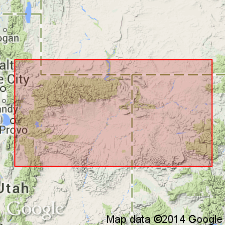
- Usage in publication:
-
- Red Creek quartzite*
- Modifications:
-
- Original reference
- Dominant lithology:
-
- Quartzite
- Schist
- AAPG geologic province:
-
- Southern Rocky Mountain region
Summary:
Pg. 42, 62, 70, 187. Red Creek quartzite. A quartzite (very crystalline and white) with intercalated beds of hornblendic, chloritic, and micaceous schists, all greatly implicated. Thickness 10,000 feet. Unconformably underlies the red Uinta sandstone. Believed to be Eozoic [Precambrian].
Well exposed in Red Creek Canyon and at head of Willow Creek. Red Creek Canyon separates Quartz Mountain and Mount Wheeler [northeast corner of Uinta County, Utah].
Source: US geologic names lexicon (USGS Bull. 896, p. 1784).
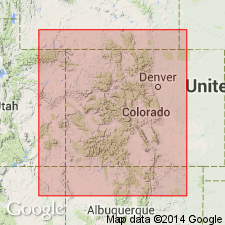
- Usage in publication:
-
- Red Creek Quartzite*
- Modifications:
-
- Areal extent
- AAPG geologic province:
-
- Southern Rocky Mountain region
Summary:
Pg. D2 (fig. 1), D4, D10. Red Creek Quartzite (also called Red Creek Complex). Recognized in Uinta Mountains, [Daggett County], northeasternmost Utah and [Moffat County], northwesternmost Colorado. Inferred to be part of Precambrian W age province of Wyoming. Radiometric age [Rb-Sr] of 2,320 Ma is a minimum and is interpreted to mark a younger metamorphic event.
(See W.R. Hanson, 1965, USGS Prof. Paper 490.)
Source: Publication.
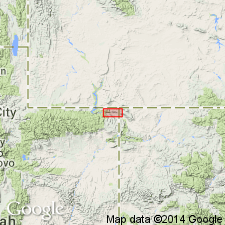
- Usage in publication:
-
- Red Creek Quartzite
- Modifications:
-
- Revised
- AAPG geologic province:
-
- Southern Rocky Mountain region
Summary:
Some rocks included in Red Creek Quartzite are part of the Owiyukuts Complex (new). Red Creek overlies the Owiyukuts in Moffat Co, CO and west into UT along the north flank of the Uinta Mountains in the Southern Rocky Mountain region. Is a unit composed of: very fine grained feldspathic quartzite interleaved with garnet amphibolite layers at base; a middle red and purple quartzite; and an upper unit of pelite, carbonate, and quartzite. Total thickness may exceed 7 km. Comprises the miogeoclinal supracrustal part of the Proterozoic orogen. Correlates with the Heart Formation, Medicine Peak Quartzite, Lookout Schist, and Sugarloaf Quartzites of the Medicine Bow Mountains, WY. Assigned to the Early Proterozoic.
Source: GNU records (USGS DDS-6; Denver GNULEX).
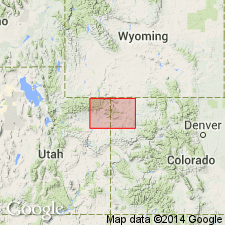
- Usage in publication:
-
- Red Creek Quartzite*
- Modifications:
-
- Age modified
- AAPG geologic province:
-
- Southern Rocky Mountain region
Summary:
Age changed from Archean W to Late Archean and Early Proterozoic? age. Considered to be older than a 2,300 m.y. (Rb-Sr muscovite age). Also considered to be Early Proterozoic based on similarities in lithology and structural setting with rocks in WY. Crops out only west and north of Browns Park in Moffat Co, CO and in Daggett Co, UT in the Southern Rocky Mountain region.
Source: GNU records (USGS DDS-6; Denver GNULEX).
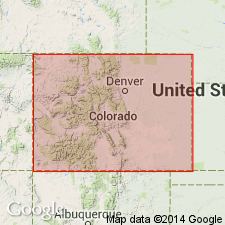
- Usage in publication:
-
- Red Creek Quartzite*
- Modifications:
-
- Age modified
- AAPG geologic province:
-
- Southern Rocky Mountain region
Summary:
Composed of metaquartzite, subordinate kyanite-staurolite- and garnet-bearing quartz-muscovite and chlorite schists and minor marble, all intruded by small mafic sills metamorphosed to amphibolite. Is about 6 km (20,000 ft) thick. Overlain unconformably by Uinta Mountain Group. Exposed in a sq km at CO-UT border on north side of Uinta Mountains, in Southern Rocky Mountain region; inferred to be present in subsurface in WY. Age on either side of 2,500 m.y., but Early Proterozoic age suggested on basis of lithologic resemblance to Libby Creek Group of WY. Considered Late Archean in age.
Source: GNU records (USGS DDS-6; Denver GNULEX).
For more information, please contact Nancy Stamm, Geologic Names Committee Secretary.
Asterisk (*) indicates published by U.S. Geological Survey authors.
"No current usage" (†) implies that a name has been abandoned or has fallen into disuse. Former usage and, if known, replacement name given in parentheses ( ).
Slash (/) indicates name conflicts with nomenclatural guidelines (CSN, 1933; ACSN, 1961, 1970; NACSN, 1983, 2005, 2021). May be explained within brackets ([ ]).

